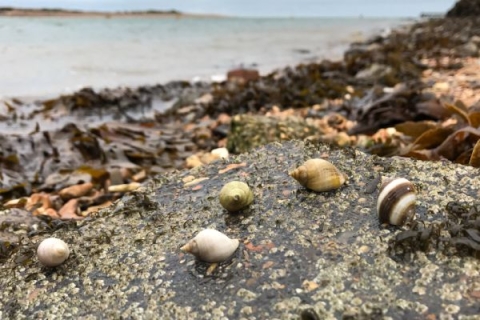

Portsmouth researchers will receive just over 300,000 euros to look at genetic and behavioural changes in wildlife.
28 August 2020
3 min read
A new project has been launched to remove hormone-changing pollutants from the environment.
Project RedPol is a 2.8m euro project, involving researchers from the universities in the English Channel area (Portsmouth, Brighton, Caen and Le Havre), Chichester Harbour Conservancy and the French company Toxem.
It aims to develop biotechnology products (biotests) to identify and analyse endocrine disrupting compounds (EDCs) and eliminate them at source. There are at least 1,200 suspected endocrine compounds that need to be evaluated across Europe.
We have assembled a team from across the University so that we can use the latest technologies to measure changes in gene expression and adapt behavioural monitoring, developed for use in biomedical research, to measure the impacts of pollution in marine organisms.
Professor Alex Ford, Deputy Director of the Centre for Blue Governance
Endocrine disruptors are chemicals that can interfere with endocrine (or hormonal) systems and can cause cancerous tumours, birth defects, and other developmental disorders in human beings. This also has impact on the wider environment, leading to reproductive, development and behavioural problems in wildlife, which can generate an imbalance in reproduction and environmental health.
For example, marine snail populations collapsed globally due to chemicals in antifouling used on boats that made females develop penises, which prevented successful reproduction. Fish downstream of sewage treatment plants and in polluted estuaries often show signs of feminisation following exposure to chemicals that act like estrogens.
Researchers from the University of Portsmouth will receive just over 350,000 euros to look at genetic and behavioural changes in wildlife. As part of this work, they will also conduct the first acoustic survey of how hormone changes affects crabs’ behaviour.
Alex Ford, Professor of Biology and Deputy Director of the Centre for Blue Governance at the University of Portsmouth, said: “This is a fantastic opportunity for us to work with experts from across the Channel. We have assembled a team from across the University so that we can use the latest technologies to measure changes in gene expression and adapt behavioural monitoring, developed for use in biomedical research, to measure the impacts of pollution in marine organisms.
“We are also excited to be able to trial whether the effects we observed in the lab can be replicated in the wild by tracking crabs in real-time to see how they respond to pollution. Larger human populations and climate change mean storm water overflows are increasingly flooding our coastal environments with raw untreated sewage. This sewage not only contains faecal material but a variety of pollutants including endocrine disruptors, pesticides, plastic additives, surfactants, metals and many more.
“A new environment bill is being passed by the government and we must make sure that our freshwater and coastal resources are protected. To protect these environments from endocrine disruptors we must first have the tools to identify what is harmful. Legislation to ban these substances can often be a lengthy process and, even after these chemicals are banned, their legacy can go on for decades.”
